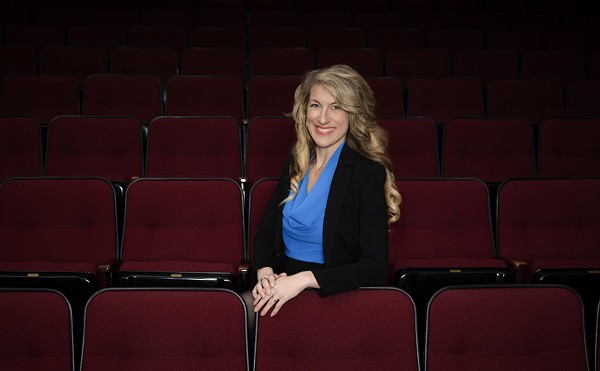Emblematic of that notion, the production is blessed with a lovely unit set depicting the Western Wall in Jerusalem. As designed by Sanghee Moon and lit by Justin Barisonek, the wall emanates a healing luster even as you can sense the desert dust blowing off it. Without calling undue attention to itself, this simple set does what sets are supposed to do: It provides the play with a universe.
On its most external level, the world here is Israel in 1991. Howard and Judy Kleinman arrive from the States to visit son Marc just as the Gulf War is erupting. Talk about bad timing. Not only must the Kleinmans dodge Iraqi Scud missiles and learn how to wear gas masks, they also receive a high-voltage culture shock when they learn that their once-dutiful son has joined an Orthodox Yeshiva, changed his name (now he's Moishe) and is 24 hours away from entering into an arranged marriage. What's a parent to do?
In his program notes, director Doug Finlayson likens Joshua Ford's play to "the great tradition of [Eugene] O'Neill and [Arthur] Miller," illustrating why theatergoers are well advised to not read director's notes. Ford would be more accurately likened to Larry Gelbart; his play -- while agreeably entertaining, and even at times thoughtful -- has more in common with an earnest episode of M*A*S*H than with Miller's All My Sons.
This is the kind of script that owes as much to geometry as inspiration. Once the author establishes his four leading roles -- father, mother, son, fiancée -- you can be assured that by evening's end every conceivable acting equation will have been played out. There are scenes between mother and father, father and son, son and mother, mother and fiancée, fiancée and son. There's not a scene between father and fiancée, but then this is a short evening. Too short. Perhaps its brevity can be attributed to the script's television-sitcom roots, but the actors have been directed to steeplechase through the material. As a result, some of the play's nuances are glossed over.
As the acerbic father, Alan Knoll makes the mistake of knowing that many of his lines are amusing. At his sharpest, Knoll is an actor gifted with impeccable timing. But here too much of his energy is misguided. Rather than play the character, he sets up laughs. Knoll might consider renewing his commitment to the First Commandment of Humor, as decreed by Neil Simon: Never try to make comedy funny; honesty will do quite nicely, thank you.
Knoll's other problem is that too often his delivery overpowers the room. The Sarah & Abraham Wolfson Studio Theatre is a marvelously intimate playing space. But what might be suitable projection in another theater can assault the ears here. It's the director's responsibility to ensure that his actors are emoting at the proper tone.
Diana Nelinson's subdued portrait of the mother fares better. She conveys confusion, hurt and hope, all in a straight-on manner that allows the audience to share her concern for her disintegrating family. There's also a sweet performance by John Herget as another Yeshiva student who has turned his back on the American way of life. Herget instills innocent charm into a role that is little more than a plot device. His work emits a cleanliness that is in harmony with the play's aspirations.
And indeed, the play does have aspirations. This is a story about faith -- the inspiring faith of one's spiritual fathers, the implicit faith between fathers and sons. But many of those aspirations are not fully realized here. Although Miklat is intriguing, this production is never quite as funny as it could be, nor (until the affecting final minutes) as serious as it should be. In one scene, it's not as erotic as it demands to be. Except for that mesmerizing Western Wall, there's more to Miklat than meets the eye.





